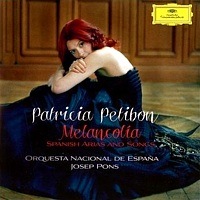Ah, the “themed” recital disc! Sometimes it’s a special treasure in a collector’s trove showing off the lesser known skills of a beloved performer; more often, an object of mirth and ridicule toward those who’ve been ill-advised or have already committed most of their repertoire in the studio and are now starting in on someone else’s.
The Rolls Royce in this genre for me is the Leontyne Price Christmas Album with Herbert von Karajan and the Vienna Phi; the only recital album he ever consented to and a dignified display of that soprano’s gifts in holiday chestnuts just slightly overarranged. Marilyn Horne’s American Songbook album also uses traditional, if slightly corny, charts that few other singers could carry off with a straight face and an honest mien.
The absolute nadir, in my judgment, is Jessye Norman’s threateningly titled “With a Song in My Heart” with John Williams and the Boston Pops. She sings Gershwin and Porter arrangments that sound like they were orchestrated by Shostakovich on a bad acid trip. Hilarity ensues right around the time Jessye bellows “I Love Paris” to an accompaniment that sounds like a herd of elephants let loose on the kettle drums.
So, having been presented by our esteemed Patroness with two new Latin themed releases from Deutsche Grammophon it was with not a little trepidation that I plunged into the assignment. The first can be dispatched fairly quickly.
“Roberto Alagna’s Pasión” sounds less like a recital disc than a fragrance, so already he may have missed a bet there. Much is made in the liner notes of Mr. Alagna’s Spanish heritage (?) with an Argentinian grandmother and his family having emmigrated from Spain to Sicily in the 1870’s (when he was still just a lad.) Paragraphs are written on his experience in this repertoire having made a living as a cabaret singer in his youth and his love of the tango and bolero. I really started to believe for a moment that this wasn’t just another venal attempt by a record producer-arranger-conductor, Mr. Yvan Cassar by name, to separate an unsuspecting public from its coin. Relishing the chance to hear the male perspective in the same kind of material that Gloria Estefan lavished so much care on in her Cuban album “Mi Tierra,” I tucked in.
Almost immediately it’s apparent that the voice just isn’t a good fit, the vocal production being much too big and even. In the third track, Historia de un Amor, he’s joined by the magnificent Mexican chanteuse Lila Downs and you realize everything you’ve been missing up until then. A lot of it lies in the fact that this music is so overtly emotional and Mr. Alagna is just giving it the general once-over with the vocal glamour intact. There’s none of the requisite jazzy savoring of words or breathy rubato, plus his constant glottal attack from under the pitch on nearly every phrase becomes tiresome.
Then there’s the problem of the hackneyed choice of songs. Track four, La Cumparsita, is that tango melody that you’ve heard all your life on TV commercials. Who knew it had words ? Track six, Cielito Lindo, has the famous ”Ay, yay,ay, yay!” chorus. Yeah, no kidding. By the time Mr. Alagna opened track nine with cowboy yipping and yelping like a gaucho on the Pampas I almost did a spit-take on my sofa.
The amusing part is that I already knew nearly every melody on this CD and I don’t own much Latin music to speak of, so musicologically it’s a bit of a let down. Sadly, as well, it’s all sung in a generalized international Spanish that doesn’t take into account which country the song is from. It might as well all be Mexico. You couldn’t sing the Neapolitan songbook like this and get away with it. Arrangements are colorful but tawdry and sticky sweet and this whole enterprise can only be viewed as a missed opportunity. Not a surprise from this very facile singer.
Our next entry is on a much more serious level, for here we have an actual artiste tackling classical Latin American song. I have been a fan of Patricia Petibon since I saw her on DVD as Blanche de la Force in Carmelites over a decade ago. I think it would be a great pleasure to hear her sing any of this music live, maybe even more so than this lovely recording.
Ms. Petibon’s disc is titled “Melancolia” which is especially appropriate to that common Spanish combination of love-longing-pain-hatred that seems to fuel their composers. There’s an honest Spanish flavor to the performance of these excellent selections and Ms. Petibon is supported very well here by the Orquestra Nacional de España lead by Josep Pons. Their playing is magnificent throughout. Sensitive and vibrant with a real rubato when needed. Most special is the contribution of Flamenco guitarist, Daniel Manzanas, on both Castellanos’ El vito and the Gomez-Saavedra Adiós Granada.
She hits her stride on track seven which is the Giménez Zapateado, a comic whiplash of a tarantella with a lot of spoken exclamation that’s very funny. The most important repertoire on this disc is the four-song cycle written for her by the French composer Nicolas Bacri, recorded here for the first time. These numbers are especially evocative of the Spanish style and a welcome addition to the catalog.
A bash at the ubiquitous Villa-Lobos Bachianas Brasileiras No. 5 results in a a fully committed reading, though Bido Sayao’s crown remains secure.
Ms. Petibon is undoubtedly a skilled linguist, musician and a very communicative artist. Her singing has both precision and the necessary freedom in this repertoire and she does some magnificent North African melismas. Her Spanish is more than correct but, again, I wish she would have spent a little more time perfecting the idiomatic Spanish ‘s’. It’s a unique sound and she just doesn’t quite capture it.
The only other problem is a matter of tone. Above the staff her voice is wiry and especially at forte can sound blanched. There’s a lot of straight tone ‘Ay!’ going on here and it made me wish, at times, for a singer with a fuller, more varied, instrument. I think the close miking is partly to blame and I would hope in live performance that this particular critique would not apply. On my first listen the brittle tone was almost a dealbreaker, but subsequent hearings have put it in better perspective.
So, for Ms. Petibon I give a resounding ‘Olé!’. For Mr. Alagna; No-lé.




